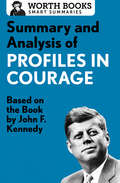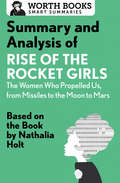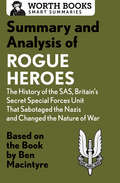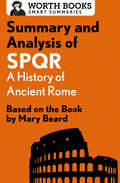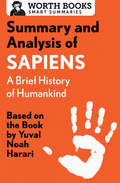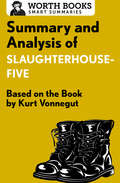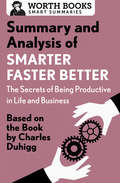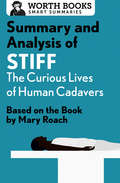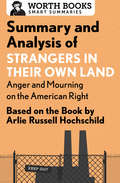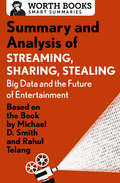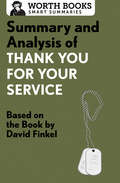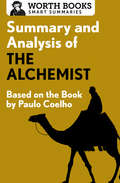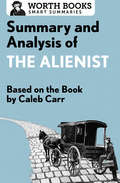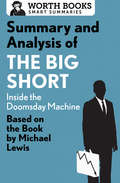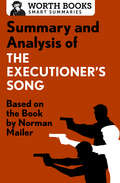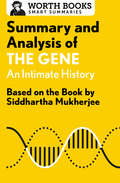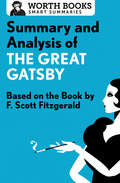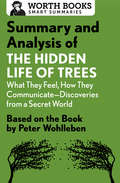- Table View
- List View
Summary and Analysis of Profiles in Courage: Based on the Book by John F. Kennedy (Smart Summaries)
by Worth BooksSo much to read, so little time? This brief overview of Profiles in Courage tells you what you need to know—before or after you read John F. Kennedy&’s book. Crafted and edited with care, Worth Books set the standard for quality and give you the tools you need to be a well-informed reader. This short summary and analysis of Profiles in Courage includes: Historical contextChapter-by-chapter overviewsProfiles of the main charactersDetailed timeline of key eventsImportant quotesFascinating triviaGlossary of termsSupporting material to enhance your understanding of the original work About Profiles in Courage by John F. Kennedy: John F. Kennedy&’s Profiles in Courage takes an in-depth look at eight US senators who displayed courage by going against their political party&’s platform and acting on integrity and convictions. These timeless stories of political courage and inner strength are no less poignant today than upon the book&’s original publication in 1955. The summary and analysis in this ebook are intended to complement your reading experience and bring you closer to a great work of nonfiction.
Summary and Analysis of Quiet: Based on the Book by Susan Cain
by Worth BooksSo much to read, so little time? This brief overview of Quiet tells you what you need to know—before or after you read Susan Cain’s book. Crafted and edited with care, Worth Books set the standard for quality and give you the tools you need to be a well-informed reader. This short summary and analysis of Quiet: The Power of Introverts in a World That Can’t Stop Talking by Susan Cain includes: Historical contextChapter-by-chapter summariesImportant quotesFascinating triviaGlossary of termsSupporting material to enhance your understanding of the original workAbout Quiet by Susan Cain: It’s time for a “quiet revolution!” America’s “culture of popularity” holds extroverts—those who are gregarious, outspoken, and larger-than-life—in higher regard than those who tend to be reserved, serious, and contemplative. But think of all the great introverts—Rosa Parks, Albert Einstein, John Quincy Adams, and Lewis Carroll, to name a few—who were great leaders and thinkers, but just have a different way of expressing themselves. Based on extensive research related to the latest psychology and neuroscience, and in-depth interviews with renowned psychologists and professors, Quiet looks at “the power of introverts” from a cultural point of view. The summary and analysis in this ebook are intended to complement your reading experience and bring you closer to great works of nonfiction.
Summary and Analysis of Rise of the Rocket Girls: Based on the Book by Nathalia Holt
by Worth BooksSo much to read, so little time? This brief overview of Rise of the Rocket Girls tells you what you need to know—before or after you read Nathalia Holt’s book. Crafted and edited with care, Worth Books set the standard for quality and give you the tools you need to be a well-informed reader. This short summary and analysis of Rise of the Rocket Girls includes: Historical contextChapter-by-chapter overviewsProfiles of the main charactersDetailed timeline of key eventsImportant quotesFascinating triviaGlossary of termsSupporting material to enhance your understanding of the original work About Rise of the Rocket Girls: The Women Who Propelled Us, from Missiles to the Moon to Mars by Nathalia Holt: When the Jet Propulsion Laboratory first began researching rocket science and the possibilities within space exploration in the middle of the twentieth century, they hired a hyper intelligent group of female mathematicians to work with their staff of engineers. In Rise of the Rocket Girls: The Women Who Propelled Us, from Missiles to the Moon to Mars, Nathalia Holt examines four decades of the JPL’s major accomplishments from interviews and research of these groundbreaking women who were recruited to be “human computers,” Including, from this team of unsung heroes, Barbara Paulson, Helen Ling, Sue Finley, and Sylvia Lundy. As the JPL’s projects evolved from developing missiles and satellites to executing moon landings and planetary exploration projects, the women’s roles grew too, becoming the team responsible for launching America into Space—and they did it all while balancing marriage and children, too. The summary and analysis in this ebook are intended to complement your reading experience and bring you closer to a great work of nonfiction.
Summary and Analysis of Rogue Heroes: Based on the Book by Ben Macintyre (Smart Summaries)
by Worth BooksSo much to read, so little time? This brief overview of Rogue Heroes tells you what you need to know—before or after you read Ben Macintyre&’s book. Crafted and edited with care, Worth Books set the standard for quality and give you the tools you need to be a well-informed reader. This short summary and analysis of Rogue Heroes includes: Historical contextChapter-by-chapter overviewsProfiles of the main charactersDetailed timeline of eventsImportant quotes and analysisFascinating triviaGlossary of termsSupporting material to enhance your understanding of the original workAbout Rogue Heroes:The History of the SAS, Britain&’s Secret Special Forces Unit That Sabotaged the Nazis and Changed the Nature of War by Ben Macintyre: Ben Macintyre&’s Rogue Heroes is a gripping account of the inception of the British SAS, or Special Air Service, during World War II, which became the forerunner to modern military special forces. In mid-1941, the Axis attack on Europe and North Africa knocked Great Britain onto the ropes. Facing the brilliant German general Erwin Rommel, the &“Desert Fox,&” British forces in North Africa were fighting a losing campaign. An iconoclastic young officer named David Stirling conceived an entirely new form of warfare, based on daring attacks by small groups of highly trained soldiers on large strategic targets, striking deep from behind enemy lines. This revolutionary unit became the SAS and changed the nature of warfare itself. The summary and analysis in this ebook are intended to complement your reading experience and bring you closer to a great work of nonfiction.
Summary and Analysis of SPQR: Based on the Book by Mary Beard (Smart Summaries)
by Worth BooksSo much to read, so little time? This brief overview of SPQR tells you what you need to know—before or after you read Mary Beard&’s book. Crafted and edited with care, Worth Books set the standard for quality and give you the tools you need to be a well-informed reader. This short summary and analysis of SPQR: A History of Ancient Rome by Mary Beard includes: Historical contextChapter-by-chapter summariesDetailed timeline of key eventsProfiles of the main charactersImportant quotesFascinating triviaGlossary of termsSupporting material to enhance your understanding of the original work About SPQR: A History of Ancient Rome by Mary Beard: A sweeping history of the ancient capital of Italy, SPQR contains all of the excitement of Roman conquest and a fascinating view of everyday life in the days of Cicero, Mark Antony, and Julius Caesar. Renowned historian Mary Beard narrates the major battles, the betrayals, assassinations, and revolts, the remarkable reign of Augustus, and the delicate balance of maintaining peaceful relations across far-flung provinces. With brilliant analysis and vivid historical detail, SPQR was a New York Times bestseller and a National Book Critics Circle Award Finalist. The summary and analysis in this ebook are intended to complement your reading experience and bring you closer to a great work of nonfiction.
Summary and Analysis of Sapiens: Based on the Book by Yuval Noah Harari
by Worth BooksSo much to read, so little time? This brief overview of Sapiens: A Brief History of Humankind tells you what you need to know—before or after you read Yuval Noah Harari’s book. Crafted and edited with care, Worth Books set the standard for quality and give you the tools you need to be a well-informed reader. This short summary and analysis of Sapiens includes: Historical contextChapter-by-chapter overviewsCharacter profilesDetailed timeline of key eventsImportant quotesFascinating triviaGlossary of termsSupporting material to enhance your understanding of the original workAbout Sapiens: A Brief History of Humankind by Yuval Noah Harari: Sapiens is a wide-ranging account of human history that upends the conventional wisdom about our species with novel, even startling, theories about how we developed and where we’re headed. The bestselling book Sapiens takes the reader from humanity’s remote origins in East Africa; through its spread to societies and empires around the world; and finally to the present, when Sapiens as we know them may be about to disappear. Throughout this journey, Homo Deus author Yuval Noah Harari offers new insights into the importance of language, imagination, and even ignorance in the development of human history. The summary and analysis in this ebook are intended to complement your reading experience and bring you closer to a great work of nonfiction.
Summary and Analysis of Shrill: Based on the Book by Lindy West
by Worth BooksSo much to read, so little time? This brief overview of Shrill: Notes from a Loud Woman tells you what you need to know—before or after you read Lindy West’s book. Crafted and edited with care, Worth Books set the standard for quality and give you the tools you need to be a well-informed reader. This short summary and analysis of Shrill: Notes from a Loud Woman includes: Chapter-by-chapter overviewsCharacter profilesImportant quotesFascinating triviaGlossary of termsSupporting material to enhance your understanding of the original work About Shrill: Notes from a Loud Woman by Lindy West: A New York Times–bestselling memoir by feminist writer and humorist Lindy West, Shrill: Notes from a Loud Woman follows the author’s metamorphosis from a painfully shy girl to a confidence-boosting journalist. Written in a no-holds-barred style, full of wisecracking, vulnerability, and humanity, West throws open a window and asks us to peer inside the sometimes lonely and misunderstood world of womanhood. Shrill examines how society views and treats big girls with big ideas and personalities. The discussion isn’t always pretty (touching on topics such as abortion, period stigma, and rape culture), but it’s entertaining and thought-provoking. Her story is a ballsy and provocative look at what it means to be fat and female in America. The summary and analysis in this ebook are intended to complement your reading experience and bring you closer to a great work of nonfiction.
Summary and Analysis of Slaughterhouse-Five
by Worth BooksSo much to read, so little time? This brief overview of Slaughterhouse-Five tells you what you need to know—before or after you read Kurt Vonnegut’s book. Crafted and edited with care, Worth Books set the standard for quality and give you the tools you need to be a well-informed reader. This short summary and analysis of Slaughterhouse-Five by Kurt Vonnegut includes: Historical context, Chapter-by-chapter summaries, Analysis of the main characters, Themes and symbols, Important quotes, Fascinating trivia, Glossary of terms, Supporting material to enhance your understanding of the original work. About Slaughterhouse-Five by Kurt Vonnegut: Kurt Vonnegut’s New York Times–bestselling novel is one of the twentieth century’s great anti-war novels. It tells the story of Billy Pilgrim, an American soldier in World War II, who survives the firebombing of Dresden. More than a satire of the effects of war, Slaughterhouse-Five is journey through space and time, challenging our perceptions of humanity, free will, and the universe itself. The summary and analysis in this ebook are intended to complement your reading experience and bring you closer to a great work of fiction.
Summary and Analysis of Smarter Faster Better: Based on the Book by Charles Duhigg (Smart Summaries)
by Worth BooksSo much to read, so little time? This brief overview of Smarter Faster Better tells you what you need to know—before or after you read Charles Duhigg&’s book. Crafted and edited with care, Worth Books set the standard for quality and give you the tools you need to be a well-informed reader. This summary of Smarter FasterBetter by Charles Duhigg includes: Historical contextChapter-by-chapter summariesCharacter profilesDetailed timeline of eventsImportant quotesFascinating triviaGlossary of termsSupporting material to enhance your understanding of the original workAbout Smarter Faster Better by Charles Duhigg: Smarter Faster Better:The Secrets of Being Productive in Life and Business provides an in-depth look at some of the world&’s most successful individuals, teams, and corporations, and breaks down the secrets of their productivity. With deep analysis backed by recent scientific research, Smarter FasterBetter uncovers the art and science of how to get more done. From the story of how a group of creatives turned a failed script into Disney&’s megahit Frozen, to Jack Welch&’s ambitious goals at General Electric in the &’90s, to the trials and travails of a marine at basic training, Smarter Faster Better explains the science of productivity in a relatable, actionable, and interesting way. The summary and analysis in this ebook are intended to complement your reading experience and bring you closer to a great work of nonfiction.
Summary and Analysis of Stiff: Based on the Book by Mary Roach
by Worth BooksSo much to read, so little time? This brief overview of Stiff tells you what you need to know—before or after you read Mary Roach’s book. Crafted and edited with care, Worth Books set the standard for quality and give you the tools you need to be a well-informed reader. This short summary and analysis of Stiff: The Curious Lives of Human Cadavers by Mary Roach includes: Historical contextChapter-by-chapter summariesProfiles of the characters and placesImportant quotesFascinating triviaGlossary of termsSupporting material to enhance your understanding of the original work About Stiff: The Curious Lives of Human Cadavers by Mary Roach: Acclaimed journalist Mary Roach’s bestselling book Stiff offers an inside look through the through the weird world of human cadavers. This globe-spanning story is deeply informative, surprisingly funny, and occasionally disgusting. These “superheroes,” as Roach refers to them, brave high-speed car crashes, gunshots, decomposition in the sun, and other indignities all in the name of advancing science and making life better for the living. The summary and analysis in this ebook are intended to complement your reading experience and bring you closer to a great work of nonfiction.
Summary and Analysis of Strangers in Their Own Land: Based on the Book by Arlie Russell Hochschild (Smart Summaries)
by Worth BooksSo much to read, so little time? This brief overview of Strangers in Their Own Land tells you what you need to know—before or after you read Arlie Russell Hochschild&’s book. Crafted and edited with care, Worth Books set the standard for quality and give you the tools you need to be a well-informed reader. This short summary and analysis of Strangers in Their Own Land: Anger and Mourning on the American Right includes: Historical contextChapter-by-chapter overviewsCharacter profilesDetailed timeline of eventsImportant quotesFascinating triviaGlossary of termsSupporting material to enhance your understanding of the original work About Strangers in Their Own Land by Arlie Russell Hochschild: Renowned sociologist Arlie Russell Hochschild seeks to understand why some American conservatives continue to vote for policies that ultimately harm them. She traveled to Louisiana to complete a five-year study, talking to members of the Tea Party and attempting to breach the &“empathy wall&” that stands between conservatives and liberals. A compassionate observer, Hochschild pursues the heart of the &“deeper story,&” blaming the narrative—not her subjects—that informs these peoples&’ choices. She particularly examines the long history of environmental pollution in the region and the state governments&’ failure to address it—a failure that this political faction refuses to condemn. Strangers in Their Own Land is a compelling analysis of one of the most important factors in American culture today, and Hochschild&’s measured and empathic approach leads her readers toward a greater understanding of their fellow citizens. The summary and analysis in this ebook are intended to complement your reading experience and bring you closer to a great work of nonfiction.
Summary and Analysis of Streaming, Sharing, Stealing: Big Data and the Future of Entertainment
by Worth BooksSo much to read, so little time? This brief overview of Streaming, Sharing, Stealing tells you what you need to know—before or after you read Michael D. Smith’s and Rahul Telang’s book. Crafted and edited with care, Worth Books set the standard for quality and give you the tools you need to be a well-informed reader. This short summary and analysis of Michael D. Smith and Rahul Telang’s Streaming, Sharing, Stealing includes: Historical context, Chapter-by-chapter summaries, Character profiles, Important quotes, Fascinating trivia, Glossary of terms, Supporting material to enhance your understanding of the original work. About Streaming, Sharing, Stealing by Michael D. Smith and Rahul Telang: There is a new world order in the entertainment industry. Digital technology has contributed to an explosion of content in the entertainment business as Netflix, Amazon, and Apple upend traditional entertainment, changing the way in which television, film, music, and books are made and consumed. In Streaming, Sharing, Stealing: Big Data and the Future of Entertainment, authors Smith and Telang document this massive change and demonstrate conclusively that making data-driven decisions and understanding customer behavior are the keys to the new marketplace. The summary and analysis in this ebook are intended to complement your reading experience and bring you closer to a great work of nonfiction.
Summary and Analysis of Thank You for Your Service: Based on the Book by David Finkel
by Worth BooksSo much to read, so little time? This brief overview of Thank You for Your Service tells you what you need to know—before or after you read David Finkel’s book. Crafted and edited with care, Worth Books set the standard for quality and give you the tools you need to be a well-informed reader. This short summary and analysis of Thank You for Your Service includes: Historical contextChapter-by-chapter overviewsProfiles of the main charactersImportant quotesFascinating triviaGlossary of termsSupporting material to enhance your understanding of the original work About Thank You for Your Service by David Finkel: Pulitzer Prize–winning author David Finkel’s Thank You for Your Service is an intimate and powerful account of the lives of Iraq veterans after they return home. Having depicted life on the front lines in Baghdad in his first book, Finkel follows the struggle of the same soldiers’ return to civilian life. He exposes the hidden costs of war: the reality of living with post-traumatic stress disorder, the physical wounds and financial struggles of military personnel, and the spiraling suicide rate amongst veterans. Soldiers are plagued by nightmares, memory loss, violent impulses, and guilt over their dead comrades. Spouses and children are bewildered by the return of their loved ones, whose personalities have changed beyond all recognition. Finkel humanizes the aftermath of military life and makes a strong case for increased investment in veteran mental healthcare. Thank You for Your Service has received great critical acclaim and was among the New York Times, the Washington Post, and the Economist’s top 10 Books of the Year in 2013.the The summary and analysis in this ebook are intended to complement your reading experience and bring you closer to a great work of nonfiction.
Summary and Analysis of The Alchemist
by Worth BooksSo much to read, so little time? This brief overview of The Alchemist tells you what you need to know—before or after you read Paulo Coelho’s book. Crafted and edited with care, Worth Books set the standard for quality and give you the tools you need to be a well-informed reader. This short summary and analysis of The Alchemist by Paulo Coelho includes: Historical context, Part-by-part summaries, Analysis of the main characters, Themes and symbols, Important quotes, Fascinating trivia, Glossary of terms, Supporting material to enhance your understanding of the original work. About The Alchemist by Paulo Coelho: A beloved international bestseller, The Alchemist has enchanted and inspired readers for generations. Santiago, an Andalusian shepherd, is content to spend his days tending his sheep, but when he begins having recurring dreams about finding treasure at the base of the Egyptian pyramids, he understands that he must leave the comforts of home to follow his heart and live his destiny. Along the way, he meets many people who help him in his journey and he learns to interpret the omens that guide him on his path to self-discovery. Combining mysticism, legends, dreams, history, and adventure, The Alchemist is much more than a story about a man’s search for treasure—it is a fable about destiny, finding one’s path in life, and pursuing it wholeheartedly. The summary and analysis in this ebook are intended to complement your reading experience and bring you closer to a great work of fiction.
Summary and Analysis of The Alienist: Based on the Book by Caleb Carr
by Worth BooksSo much to read, so little time? This brief overview of The Alienist tells you what you need to know—before or after you read Caleb Carr’s book. Crafted and edited with care, Worth Books set the standard for quality and give you the tools you need to be a well-informed reader. This short summary and analysis of The Alienist includes: Historical contextChapter-by-chapter overviewsProfiles of the main charactersDetailed timeline of key eventsImportant quotesFascinating triviaGlossary of termsSupporting material to enhance your understanding of the original workAbout The Alienist by Caleb Carr: In March of 1896, the mutilated body of a prostitute is found on the still-unfinished Williamsburg Bridge—the first discovery in what becomes a string of murders in Lower Manhattan. In an unorthodox move, Police Commissioner Theodore Roosevelt enlists a team to track the deranged serial killer: reporter John Schuyler Moore, with his deep knowledge of New York’s criminal underground; alienist Dr. Laszlo Kreizler, a psychologist who specializes in psychopaths and criminals; and Sara Howard, a brave police department secretary. The group embarks on a groundbreaking endeavor of criminology—building the killer’s profile based on the gory details of the crimes to track him down and put a stop to his carnage. An evocative literary thriller and New York Times bestseller, The Alienist is being developed for a television series—slated to premiere in late 2017. The summary and analysis in this ebook are intended to complement your reading experience and bring you closer to a great work of fiction.
Summary and Analysis of The Big Short: Based on the Book by Michael Lewis (Smart Summaries)
by Worth BooksSo much to read, so little time? This brief overview of The Big Short tells you what you need to know—before or after you read Michael Lewis&’s book. Crafted and edited with care, Worth Books set the standard for quality and give you the tools you need to be a well-informed reader. This short summary and analysis of The Big Short by Michael Lewis includes: Historical contextChapter-by-chapter overviewsCharacter profilesDetailed timeline of eventsImportant quotesFascinating triviaGlossary of termsSupporting material to enhance your understanding of the original workAbout The Big Short by Michael Lewis: The writing was on the wall long before the extent of America&’s worst financial meltdown since the Great Depression was made public. The mortgage bond market had become burdened with subprime loans, most of which were deceitful in their origination and ultimately resulted in delinquencies and foreclosures. Michael Lewis&’s The Big Short: Inside the Doomsday Machine takes the reader behind the scenes, introducing the players and Wall Street institutions that unscrupulously helped fuel the housing bubble as well as the few who, not only foresaw the crash, but placed bets on the outcome. The summary and analysis in this ebook are intended to complement your reading experience and bring you closer to a great work of nonfiction.
Summary and Analysis of The Boys in the Boat: Based on the Book by Daniel James Brown
by Worth BooksSo much to read, so little time? This brief overview of The Boys in the Boat tells you what you need to know--before or after you read Daniel James Brown's book. Crafted and edited with care, Worth Books set the standard for quality and give you the tools you need to be a well-informed reader. This short summary and analysis of The Boys in the Boat by Daniel James Brown includes: Historical contextChapter-by-chapter summariesDetailed timeline of key eventsProfiles of the main charactersImportant quotesFascinating triviaGlossary of termsSupporting material to enhance your understanding of the original work About The Boys in the Boat by Daniel James Brown: No one expected a ragtag crew team from the University of Washington to rise to the top of their sport--much less go to the Olympics in Germany. It was the 1930s, at the height of the Great Depression and the dawn of the Nazi party's ascendance to power, and the school had never been able to beat the Ivy League teams, but coach Al Ulbrickson had big ambitions--he just needed the right athletes. Over the next few years, the boys of the UW rowing team endured grueling days of training and countless setbacks. In the end, it was their collective dedication that brought them to compete in the 1936 Olympics in Berlin--and beat the team rowing for Adolf Hitler. A New York Times bestseller and the inspiration for the PBS documentary The Boys of '36, Daniel James Brown's The Boys in the Boat is a celebration of the human spirit and a compelling biography of a unique rowing team that brought home Olympic gold. The summary and analysis in this ebook are intended to complement your reading experience and bring you closer to a great work of nonfiction.
Summary and Analysis of The Case Against Sugar: Based on the Book by Gary Taubes (Smart Summaries)
by Worth BooksSo much to read, so little time? This brief overview of The Case Against Sugar tells you what you need to know—before or after you read Gary Taubes&’s book. Crafted and edited with care, Worth Books set the standard for quality and give you the tools you need to be a well-informed reader. This short summary and analysis of The Case Against Sugar includes: Chapter-by-chapter overviewsProfiles of the main charactersDetailed timeline of key eventsImportant quotesFascinating triviaGlossary of termsSupporting material to enhance your understanding of the original workAbout The Case Against Sugar by Gary Taubes: In his New York Times–bestseller, journalist Gary Taubes reveals how sugar became a staple in our diet and how it may be the biggest threat to our health since tobacco. Citing decades of scientific research, Taubes meticulously makes the case that sugar causes a host of diseases from obesity and diabetes to heart disease, cancer, and Alzheimer&’s. Obesity and diabetes are pandemic around the world, with more than half a billion people considered obese, including one in three Americans. With more and more American adults getting diagnosed with diabetes, the once uncommon disease has followed the spread of the sugar-rich Western diet around the globe. Tracing the history of sugar; detailing studies on how it can lead to weight gain and other medical problems; and chronicling the lengths to which the powerful sugar industry has gone to hide this information, Taubes reveals traditional advice recommending a low-fat, high-carbohydrate diet is wrong—it&’s sugar we should be looking out for. The summary and analysis in this ebook are intended to complement your reading experience and bring you closer to a great work of nonfiction.
Summary and Analysis of The Devil in the White City: Based on the Book by Erik Larson (Smart Summaries)
by Worth BooksSo much to read, so little time? This brief overview of The Devil in the White City tells you what you need to know—before or after you read Erik Larsons book. Crafted and edited with care, Worth Books set the standard for quality and give you the tools you need to be a well-informed reader. This short summary and analysis of The Devil in the White City by Erik Larson includes: Historical contextChapter-by-chapter summariesDetailed timeline of key eventsImportant quotesFascinating triviaGlossary of termsSupporting material to enhance your understanding of the original work About The Devil in the White City by Erik Larson: The Devil in the White City is the electrifying true story of the 1893 World&’s Fair in Chicago—and the serial killer who used it as his hunting ground. Meticulously researched and brimming with fascinating historical details, Larson&’s bestselling book is a powerful amalgam of historical narrative and a true crime thriller. The summary and analysis in this ebook are intended to complement your reading experience and bring you closer to a great work of nonfiction.
Summary and Analysis of The Euro: Based on the Book by Joseph E. Stiglitz
by Worth BooksSo much to read, so little time? This brief overview of The Euro tells you what you need to know—before or after you read Joseph E. Sitglitz’s book. Crafted and edited with care, Worth Books set the standard for quality and give you the tools you need to be a well-informed reader. This short summary and analysis of The Euro by Joseph E. Stiglitz includes: Historical contextChapter-by-chapter summariesProfiles of the main charactersImportant quotesFascinating triviaGlossary of termsSupporting material to enhance your understanding of the original work About The Euro by Joseph E. Stiglitz: In The Euro, Columbia Business School professor and Nobel Prize–winning economist author Joseph E. Stiglitz argues that the fundamental cause of the Eurozone’s recent economic difficulties was the creation of a single currency without the institutions to support it. The euro bound 19 countries with very different economies—and very different views about economics—together, but it did not include the institutions or rules to make such a union succeed. The results of this union are clear: although the United States has experienced growth since the financial crisis, Europe is stagnant and Eurozone unemployment remains over 10%. New York Times bestselling author Joseph Stiglitz outlines three possible ways forward: fundamental reforms to the current system, an end to the single currency experiment, or a new system entirely. The Euro is required reading for all citizens of today’s globalized world. The summary and analysis in this ebook are intended to complement your reading experience and bring you closer to a great work of nonfiction.
Summary and Analysis of The Executioner's Song: Based on the Book by Norman Mailer
by Worth BooksSo much to read, so little time? This brief overview of The Executioner’s Song tells you what you need to know—before or after you read Norman Mailer’s book. Crafted and edited with care, Worth Books set the standard for quality and give you the tools you need to be a well-informed reader. This summary of The Executioner’s Song by Norman Mailer includes: Historical contextPart-by-part summariesDetailed timeline of key eventsProfiles of the main charactersImportant quotesFascinating triviaGlossary of termsSupporting material to enhance your understanding of the original work About The Executioner’s Song by Norman Mailer: Norman Mailer’s Pulitzer Prize–winning The Executioner’s Song tells the story of Gary Gilmore, the convicted murderer whose death penalty sentence became a lightning rod for public debate over capital punishment. Though it reads like a novel, the book is a magnum opus of creative nonfiction, drawing from reams of documents and countless hours of interviews to paint a nuanced picture of Gilmore and the events that led up to his 1979 execution by firing squad. The summary and analysis in this ebook are intended to complement your reading experience and bring you closer to a great work of nonfiction.
Summary and Analysis of The Gene: Based on the Book by Siddhartha Mukherjee
by Worth BooksSo much to read, so little time? This brief overview of The Gene tells you what you need to know--before or after you read Siddhartha Mukherjee's book. Crafted and edited with care, Worth Books set the standard for quality and give you the tools you need to be a well-informed reader. This short summary and analysis of The Gene by Siddhartha Mukherjee includes: Historical contextChapter-by-chapter summariesDetailed timeline of key eventsImportant quotesFascinating triviaGlossary of termsSupporting material to enhance your understanding of the original work About Siddhartha Mukherjee's The Gene: From the Pulitzer Prize-winning author of The Emperor of All Maladies, The Gene is a rigorously scientific, broadly historical, and candidly personal account of the development of the science of genetics, the dramatic ways genes can affect us, and the enormous moral questions posed by our ability to manipulate them. As Siddhartha Mukherjee maps out the fascinating biography of the gene, from research and experimentation to scientific breakthroughs, he always returns to the narrative of his own family's tragic history of mental illness, reminding us that despite our huge leaps in knowledge, there is still much we do not understand about the incredibly complex human genome. The Gene is an important read for anyone concerned about a future that may redefine what it means to be human. The summary and analysis in this ebook are intended to complement your reading experience and bring you closer to a great work of nonfiction.
Summary and Analysis of The Great Gatsby: Based on the Book by F. Scott Fitzgerald (Smart Summaries)
by Worth BooksSo much to read, so little time? This brief overview of The Great Gatsby tells you what you need to know—before or after you read F. Scott Fitzgerald&’s book. Crafted and edited with care, Worth Books set the standard for quality and give you the tools you need to be a well-informed reader. This short summary and analysis The Great Gatsby by F. Scott Fitzgerald includes: Historical contextChapter-by-chapter summariesAnalysis of the main charactersThemes and symbolsImportant quotesFascinating triviaSupporting material to enhance your understanding of the original work About The Great Gatsby by F. Scott Fitzgerald: Set in the Roaring Twenties—the years of excess just before the Great Depression—F. Scott Fitzgerald&’s The Great Gatsby is a remarkable cautionary tale that explores the decline of morality in pursuit of the American Dream, and offerings a memorable social critique of 1920s high society. Though commercially unsuccessful when first published, this Jazz Age–novel of decadence and betrayal endures as one of the most loved works in American literature. The summary and analysis in this ebook are intended to complement your reading experience and bring you closer to a great work of fiction.
Summary and Analysis of The Handmaid's Tale: Based on the Book by Margaret Atwood (Smart Summaries)
by Worth BooksSo much to read, so little time? This brief overview of The Handmaid&’s Tale tells you what you need to know—before or after you read Margaret Atwood&’s book. Crafted and edited with care, Worth Books set the standard for quality and give you the tools you need to be a well-informed reader. This short summary and analysis of The Handmaid&’s Tale by Margaret Atwood includes: Historical contextPart-by-part summariesAnalysis of the main charactersThemes and symbolsImportant quotesFascinating triviaGlossary of termsSupporting material to enhance your understanding of the original work About Margaret Atwood&’s The Handmaid&’s Tale: Margaret Atwood&’s dystopian literary masterpiece tells the story of Offred, a Handmaid living in the near future in what was once the United States. A new theocratic regime called the Republic of Gilead has come to power and changed life as she knew it. Once Offred had a her own name and a loving family—a husband and daughter—both of which were taken from her; now she belongs to the Commander and his hostile wife, and her only value lies in her ability to bear a child for them. She used to read books and learn; now such things are forbidden to all women. Gripping, disturbing, and so relevant today, The Handmaid&’s Tale is a brilliant novel and a chilling warning about what can happen when extreme ideas are taken to their logical conclusions. The summary and analysis in this ebook are intended to complement your reading experience and bring you closer to a great work of fiction.
Summary and Analysis of The Hidden Life of Trees: Based on the Book by Peter Wohlleben (Smart Summaries)
by Worth BooksSo much to read, so little time? This brief overview of The Hidden Life of Trees tells you what you need to know—before or after you read Peter Wohlleben&’s book. Crafted and edited with care, Worth Books set the standard for quality and give you the tools you need to be a well-informed reader. This short summary and analysis of The Hidden Life of Trees includes: Historical contextChapter-by-chapter overviewsProfiles of the main charactersImportant quotesFascinating triviaGlossary of termsSupporting material to enhance your understanding of the original work About The Hidden Life of Trees by Peter Wohlleben: The Hidden Life of Trees explains the astonishing ways trees interact with each other and respond to their environment. It details how they communicate via underground fungal networks, provide sugar to help trees that are stressed, warn each other of insect or fungal attacks, and coordinate their growth and reproduction. The author also describes how forestry methods can be improved to work with this complex inter-tree network to allow for healthier trees. Naturalist Peter Wohlleben puts into context the invaluable role forests play in sequestering carbon, talks about the contribution that large, old trees can play in battling climate change, and how caring for woodlands is vital to all life on earth. The summary and analysis in this ebook are intended to complement your reading experience and bring you closer to a great work of nonfiction.
